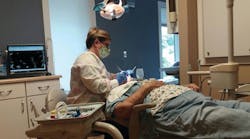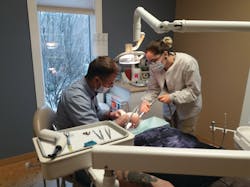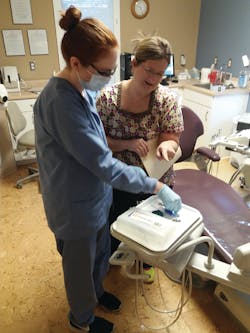Direct access and the dental hygienist: Spotlight on Michigan
Editor’s note: Join us as we continue our series highlighting direct access to dental hygiene services across the country. So far, we have learned how communities in Colorado, South Dakota, and New York have been impacted by independent and direct-access hygienists. Today, we turn the spotlight on Michigan, where dental hygienists collaborate with dentists to provide direct care under the PA 161 program.
The practice of dentistry has operated in a silo distinct from medical practice since the very beginning of the profession. Though there are theories as to why this is the case, a new movement is afoot to integrate dental professionals into medical facilities. Often a popular topic in social media circles, medical-dental integration is conceived as a way to enhance cross-disciplinary communication among health-care teams and thus improve patients’ health outcomes.
According to the Bureau of Labor Statistics, almost 3,700 dental hygienists were employed by physician offices or outpatient care centers in 2018.2 Comparatively, more than 7,000 dentists reported employment in physician offices, outpatient care centers, or hospitals.3 Though these numbers might seem low, they are on the rise, thanks to advances in technology, shifts in generational ideals, and changing dental practice legislation. Examples of medical-dental integration trends include:
- Walgreens and CVS have recently incorporated dental health services within their stores: Aspen Dental has placed in-store dental clinics in two Walgreens stores in Florida, and CVS has partnered with Smile Direct Club to offer 3-D scans in their stores nationwide.
- The dental therapist provider model has made it affordable for public health medical clinics to offer onsite dental services. Dental therapists currently practice in Alaska, Minnesota, Oregon, and Washington. Legislation has passed in Arizona, Maine, Michigan, and Vermont, and is pending in at least a dozen other states.
- According to a recently released article in Dentistry Journal, a paradigm shift in caries management from a surgical model to a medical model is impending. Instead of treating caries symptoms mainly by surgical means (drilling and filling), the medical model focuses on prevention and elimination of disease by addressing cause and risk factors.4
The American Dental Hygienists’ Association (ADHA) defines direct access as the ability of a dental hygienist to initiate treatment based on his or her assessment of a patient’s needs without the specific authorization of a dentist, treat the patient without the presence of a dentist, and maintain a provider-patient relationship.1
State spotlight: Michigan
Today we turn our spotlight on the state of Michigan, where another example of medical-dental integration is taking place under legislation that passed in 2005, allowing dental hygienists to work in Public Act 161 (PA 161) prevention programs. PA 161 hygienists provide preventive services to underserved individuals without the onsite presence of a supervising dentist, though the dentist must be readily available by phone or email. According to the latest statistics from the Michigan Department of Health and Human Services, there are 268 dental hygienists working in 54 registered programs throughout the state. Many of these programs offer affordable dental and medical care in addition to other wraparound human services.5
Summary of direct access in Michigan5
Title—PA 161 dental hygienist
Setting limitations—Public or nonprofit entity, school, nursing home
Patient population limitations—Unassigned and underserved populations only
Scope of practice limitations—Limited to oral screenings and preventive services (prophylaxis, sealants, and varnish)
Written collaborative agreement needed?—No
In-person evaluation by a dentist required?—No, although a referral is required
Dental hygiene diagnosis defined?—No
Prescriptive authority?—No
Supervision of dental assistants permitted?—No
Direct reimbursement allowable?—Yes
Minimal clinical hours or additional courses required?—No, although hygienists must complete an applicationMeet Lisa Costello, RDH
Lisa Costello, RDH, is a PA 161 dental hygienist in Michigan and the dental clinic manager of Love in Action of the Tri-Cities (LIA), a medical clinic in Grand Haven, Michigan. After a career as a medical corpsman in the United States Navy, she entered civilian dentistry in the early 1990s as an expanded-function dental assistant. Lisa graduated with a degree in dental hygiene from Ferris State University and has provided direct clinical services since 2015. Read on to learn about her successes, struggles, and why she thinks it is critical for dental hygienists to provide direct care to patients.
How do you currently use direct services?
Under the PA 161 program regulations, I provide direct preventive services to underserved patients and those not assigned to a dentist. Though my supervising dentist does not have to be present, he or she must be available via phone or email. Collaboration also includes in-person meetings to review patient charts as well as a requirement to refer patients to a dentist. As part of the LIA dental program, each patient is seen at least once a year by a volunteer dentist or by a dentist within our referral network.
What is a typical day like when you are working at LIA?
Along with providing direct clinical services, I am also the dental clinic manager. Within this role, I oversee day-to-day operations, such as determining eligibility of clients, scheduling appointments, referring patients, overseeing volunteers during clinics, and ensuring OSHA and HIPAA compliance. I supervise volunteer dentists and the supporting staff during clinic operation. We provide adult prophies, fluoride treatments, fillings, x-rays, and extractions.
What obstacles have you faced in your journey?
One obstacle that I commonly face is finding more volunteers to help us with the LIA ministry. It has been difficult to recruit hygienists and dental assistants who want to work in this type of setting. I would love for my colleagues to experience working in a public health program and witness the rewards of volunteer work.
What do you enjoy about your current position?
I thoroughly enjoy my position as a hygienist in a public health program! However, I am very limited in what services I can provide personally because the PA 161 program only allows for preventive services. I would like to see our scope of practice expand to include x-rays, scaling and root planing, and other therapeutic services. Considering the population our program serves, most patients haven’t seen a dentist in years and thus require much more than just preventive services. Thankfully, LIA has volunteer dentists who can examine, diagnose, and plan the next steps.What inspired you to pursue direct access to care?
I often see hardworking people struggle to meet basic needs for themselves and their families. There is a need for increased access to quality dental care. Sometimes even people with insurance cannot afford to go to a dentist. When the opportunity arose to serve underserved communities in a nonprofit setting with LIA, I knew it was where I wanted to be. I can’t imagine doing anything different from what I am doing now.
Why is it important for dental hygienists to provide direct care to patients?
As dental professionals, educating patients about their oral health and the systemic implications of poor oral health is crucial to preventing disease. It’s important for dental hygienists to provide direct care because it is common for patients to seek out dental care only when there is pain involved. As a side note, we know that access to dental care is extremely limited for patients living in long-term care facilities—something needs to change. As dental professionals, we need to look to the future to prevent oral care neglect for both underserved individuals and the growing elder population.
Are you required to refer patients to a dentist?
Under the PA 161 regulations, we are required to refer patients to a dentist. At LIA, we work hard to connect the patient to network dentists or low-cost providers. We also refer patients with urgent needs to the adjoining LIA Free Health Clinic. Additionally, our program has wraparound human services assistance that includes ministries such as food pantries, budgeting, clothing, and housing.
What three tools could you not live without?
I could not live without the Piezon (Hu-Friedy), which helps to quickly remove deposits and provide oral irrigation. My loupes (Ultra Light Optics) are essential for optimal vision and reducing the physical stress that comes with providing clinical services. Lastly, I rely heavily on my intraoral camera (QuickCam by Video Dental Concepts) to educate patients about their mouths.
What are your ultimate professional goals?
My ultimate professional goals and passions have led me right where I am today: serving those who are most in need as a PA 161 hygienist with LIA. I may eventually go back to school and cross over into health-care administration.
What community or civic groups have supported you in your journey?
Though I’m not part of any associations or groups, on several occasions I have met with local hygiene component leadership to help determine what the needs of the community are and how to best meet those needs. We spend time collaborating together and finding new resources to enhance our programs.
What advice would you give to someone who wants to begin a similar journey?
Really do your research. Look around at similar programs, and think outside the box. It’s OK to be good at just one thing—that one thing might just make a difference to someone.
Any final thoughts?
To me, providing direct clinical care is a ministry. As with any ministry, things do not always go as planned. If you choose a similar journey, be patient and don’t be afraid to ask others for help. Seeing someone smile after having their teeth restored brings so much joy. There are also moments of frustration, like when patients do not follow your oral hygiene recommendations. Remember that we are all on this journey together. I have seen many lives changed thanks to the symbiotic relationships built between patients, dentists, hygienists, and assistants.
References
1. American Dental Hygienists’ Association. Direct Access States. American Dental Hygienists’ Association website. https://www.adha.org/resources-docs/7513_Direct_Access_to_Care_from_DH.pdf. Updated May 2019.
2. Occupational Employment and Wages, May 2018: 29-2021 Dental Hygienists, General. Bureau of Labor Statistics website. https://www.bls.gov/oes/current/oes292021.htm. Updated March 29, 2019.
3. Occupational Employment and Wages, May 2018: 29-1021 Dentists, General. Bureau of Labor Statistics website. https://www.bls.gov/oes/current/oes291021.htm. Updated March 29, 2019.
4. Yon MJY, Gao SS, Chen KJ, Duangthip D, Lo ECM, Chu CH. Medical model in caries management. Dent J. 2019;7(2):E37. doi:10.3390/dj7020037.
5. Michigan Department of Health and Human Services. PA 161 Program. State of Michigan website. https://www.michigan.gov/mdhhs/0,5885,7-339-73971_4911_4912_6226-265001—,00.html.
MELISSA TURNER, BASDH, RDH, EFDA, has practiced clinically across the country and is a valued thought leader and advisor within the industry. She directs a nonprofit mobile dental team and is executive moderator for the Dental Peeps Network. She is also the founder of I Heart Mobile Dentistry, a Facebook support group for clinicians practicing mobile dentistry. Melissa can be reached at [email protected].









